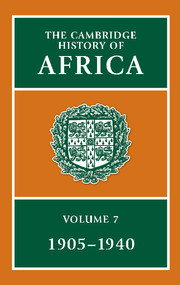Book contents
- Frontmatter
- Introduction
- 1 The imperial mind
- 2 Aspects of economic history
- 3 Christianity
- 4 Islam
- 5 African cross-currents
- 6 The Maghrib
- 7 French black Africa
- 8 British West Africa and Liberia
- 9 Belgian Africa
- 10 Portuguese Africa
- 11 Southern Africa
- 12 British Central Africa
- 13 East Africa
- 14 Ethiopia and the Horn
- 15 Egypt and the Anglo-Egyptian Sudan
- Bibliographical Essays
- Bibliography
- Index
- 10 West Africa from Senegal to Dahomey, 1935
- 13 Belgian Africa, 1939
- References
15 - Egypt and the Anglo-Egyptian Sudan
Published online by Cambridge University Press: 28 March 2008
- Frontmatter
- Introduction
- 1 The imperial mind
- 2 Aspects of economic history
- 3 Christianity
- 4 Islam
- 5 African cross-currents
- 6 The Maghrib
- 7 French black Africa
- 8 British West Africa and Liberia
- 9 Belgian Africa
- 10 Portuguese Africa
- 11 Southern Africa
- 12 British Central Africa
- 13 East Africa
- 14 Ethiopia and the Horn
- 15 Egypt and the Anglo-Egyptian Sudan
- Bibliographical Essays
- Bibliography
- Index
- 10 West Africa from Senegal to Dahomey, 1935
- 13 Belgian Africa, 1939
- References
Summary
EGYPT
Britain's occupation of Egypt, unlike that of most of her territorial acquisitions in Africa, was from its beginning in 1882 meant to be temporary. Protestations to this effect, both to Egyptians and to European governments, nevertheless failed to mask the reality of British control. The importance of Egypt to Britain's world power seemed to increase with each year of occupation, and was formally recognised in the Entente Cordiale of 1904. After that date European pressure to end the occupation ceased, and the British were allowed an even more direct role in Egypt's administration. Formally the Egyptian government retained its authority, and British policies continued to be hampered by the Capitulations and other apparatus of internationalism. But throughout the period under review, Britain retained ultimate control in Egypt, whether endowed with it legally or not. That control was successively embodied in an agent and consul-general, a high commissioner, and an ambassador, over what evolved from an Ottoman province to a protectorate and finally an independent state. The political history of the period, and much that was influenced by it, was therefore dominated by Egypt's relations with Britain.
POLITICAL CHANGE
The departure in May 1907 of Lord Cromer, who as agent and consul-general since 1883 had wielded British power in Egypt, symbolised the end of an era. Under his grim but efficient rule the sound financial administration had been provided which was required for an end to foreign occupation; the absence of political and, to a lesser extent, educational reforms served as the excuse for the occupation's continuance. In the early days British experts had been employed in small numbers to advise Egyptian officials;
Keywords
- Type
- Chapter
- Information
- The Cambridge History of Africa , pp. 742 - 787Publisher: Cambridge University PressPrint publication year: 1986
References
- 11
- Cited by

